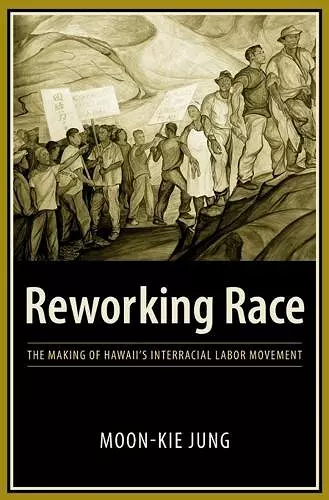Reworking Race
The Making of Hawaii's Interracial Labor Movement
Format:Hardback
Publisher:Columbia University Press
Published:12th May '06
Currently unavailable, and unfortunately no date known when it will be back

In the middle decades of the twentieth century, Hawai'i changed rapidly from a conservative oligarchy firmly controlled by a Euro-American elite to arguably the most progressive part of the United States. Spearheading the shift were tens of thousands of sugar, pineapple, and dock workers who challenged their powerful employers by joining the left-led International Longshoremen and Warehousemen's Union. In this theoretically innovative study, Moon-Kie Jung explains how Filipinos, Japanese, Portuguese, and others overcame entrenched racial divisions and successfully mobilized a mass working-class movement. He overturns the unquestioned assumption that this interracial effort traded racial politics for class politics. Instead, the movement "reworked race" by incorporating and rearticulating racial meanings and practices into a new ideology of class. Through its groundbreaking historical analysis, Reworking Race radically rethinks interracial politics in theory and practice.
In the middle decades of the 20th century, Hawai'i changed rapidly from a conservative oligarchy firmly controlled by a Euro-American elite to arguably the most progressive part of the United States. This study explains how Filipinos, Japanese, Portuguese, and others overcame racial divisions and mobilized a mass working-class movement.In the middle decades of the twentieth century, Hawai'i changed rapidly from a conservative oligarchy firmly controlled by a Euro-American elite to arguably the most progressive part of the United States. Spearheading the shift, tens of thousands of sugar, pineapple, and longshore workers eagerly joined the left-led International Longshoremen's and Warehousemen's Union (ILWU) and challenged their powerful employers. In this theoretically innovative study, Moon-Kie Jung explains how Filipinos, Japanese, Portuguese, and others overcame entrenched racial divisions and successfully mobilized a mass working-class movement. He overturns the unquestioned assumption that this interracial effort traded racial politics for class politics. Instead, he shows how the movement "reworked race" by developing an ideology of class that incorporated and rearticulated racial meanings and practices. Examining a wide range of sources, Jung delves into the chronically misunderstood prewar racisms and their imperial context, the "Big Five" corporations' concerted attempts to thwart unionization, the emergence of the ILWU, the role of the state, and the impact of World War II. Through its historical analysis, Reworking Race calls for a radical rethinking of interracial politics in theory and practice.
Reworking Race will be recognized eventually as one of the major works on the history of labor in Hawai'i. -- Jonathan Y. Okamura The Journal of American History Well written, impressively researched, and theoretically insightful, Reworking Race is an important contribution to the field. -- Francisca Oyogoa Industrial and Labor Relations Review A smart, well researched, and amply documented monograph on a fascinating and instructive case. -- Chris Rhomberg Mobilization Sound research, crisp narrative, and innovative reworking of the concept of 'interracialism'... an important contribution. -- Jose M Alamillo, Washington State University American Historical Review Theoretically and empirically rich, Reworking Race is necessary reading in the sociology of race/ethnicity and in labor and political sociology. -- Sharmila Rudrappa American Journal of Sociology
- Winner of Best Book Award 2006
- Winner of Distinguished Contribution to Scholarship Award 2007
- Winner of Oliver Cromwell Cox Book Award 2008
- Winner of Race, Labor, and Empire Book Award 2007
ISBN: 9780231135344
Dimensions: unknown
Weight: unknown
320 pages